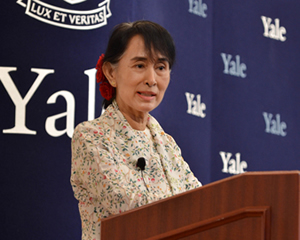
Myanmar (also known as Burma) democracy leader and Nobel Peace Prize laureate Aung San Suu Kyi spoke at Yale on September 27 as part of her first U.S. tour since leaving house arrest. She lectured about the rule of law and Burma’s road to democracy to a packed Sprague Hall crowd.
“Through our experiences,” she said, “we learned that without rule of law, our people would never be free from fear.” Suu Kyi identified the rule of law as one of the three building blocks of Burmese democracy, along with an end to ethnic conflict and amendments to the constitution, which currently allows for arbitrary arrest and detention. She was sent into house arrest under Section 10 of the Constitution, which deemed her a “destructive element” to the nation. Section 5, she mentioned, allowed arrests if an individual was deemed to have “diminished love for the government,” a purposely vague and much abused clause.
Suu Kyi, who is Yale’s 2012-13 Chubb Fellow, won a parliamentary seat earlier this year and is Chair of the Rule of Law and Tranquility Committee. She discussed reforms she thought were needed to correct the judiciary.
A start would be to take action against corrupt judges. It’s not easy, she said, for a corrupt person to turn back from an opulent lifestyle that they’ve led for quite some time. “Even sending them off to Yale won’t change them,” she said, to much laughter. “It’s a question of attitude. We need to start by imposing the rule of law on the judiciary itself. There will have to be laws enforceable against judges and civil servants.”
She also added that practicing democracies like the United States could help. For example, in the long-term, establishing the rule of law would require judiciary-to-judiciary contact between nations, law schools in Myanmar and well-trained lawyers. Yale President Richard Levin announced in his introductory remarks that Yale was establishing several initiatives in light of Suu Kyi’s visit, such as increasing its admissions focus in Myanmar.
The talk, which sold out within ten minutes, was simulcast in the Levinson Auditorium of the Yale Law School and on Yale Livestream. A large crowd outside Sprague Hall awaited Suu Kyi, who arrived smiling and wearing a white patterned jacket, flowing green skirt, and her characteristic red rose hair tie.
On the much-asked question about whether Burma is on an irreversible path to democracy, Suu Kyi responded by saying that no process is ever truly irreversible. The key, she said, was to make sure to reach the point where people recognize that “to reverse the process will be more painful than to continue.”
In addition to sharing her thoughts on the rule of law, Suu Kyi touched on her personal life. During the question-and-answer session, Levin asked her what she would have done differently earlier in life to help her cope with house arrest.
“I would have been a better pupil to my music teacher,” she said. “It would have given me much solace throughout the years.” She urged students to develop “inner resources” that will help them cope with life. Try to strengthen yourself internally, she said, and don’t depend on external factors.
“We have a saying in Burmese…that you should not only be able to suffer the hardships of bad fortune, you also need to be able to suffer the hardships of good fortune. You should not be shaken by the hope of gain and comfort. To be corrupted is to give in to the hardships of good fortune,” she said.
Suu Kyi also addressed free speech, the role of religious groups in solving ethnic conflict, and the universality of human rights during the rest of the question-and-answer session.
Her visit to Yale included a forum earlier in the morning of September 27, and a welcome dinner hosted by Timothy Dwight College the day before. The Chubb Fellowship was established in 1936, designed to promote student interest in public affairs; previous guests have included former U.S. presidents, diplomats, leaders in art, and more.
